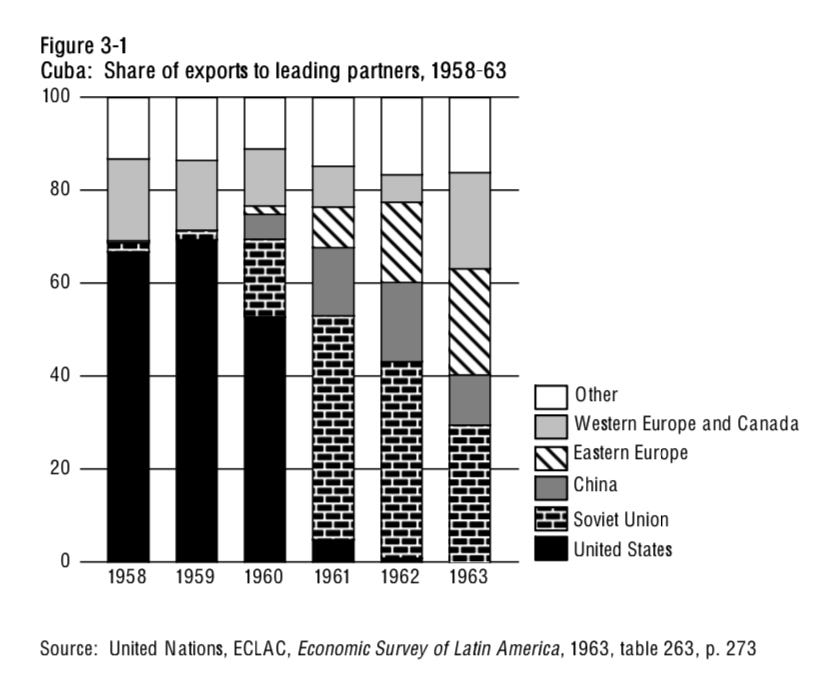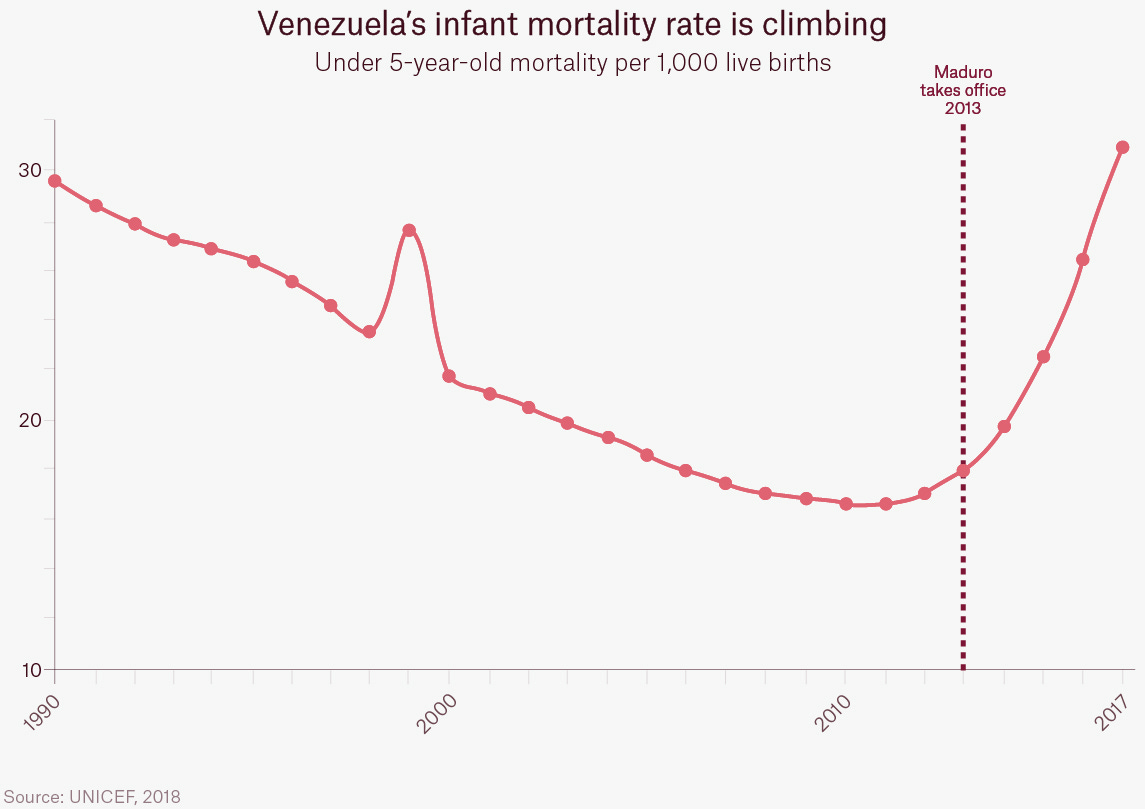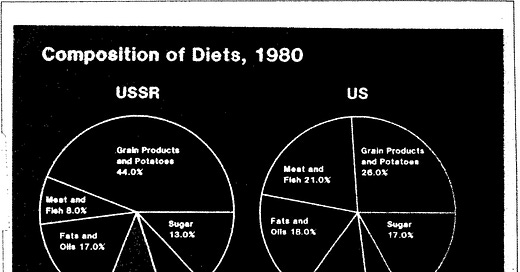

Discover more from That Great Fiction
Sanctions Saved Socialism
“The choice is between capitalism and chaos.”
History has vindicated the words of Ludwig Von Mises time and time again. Socialism was always going to fall due to its impossible task of economic calculation, yet the US government has tried and failed many times to speed up the process through sanctions and embargo.
Sanctions in practice have unintended consequences such as boomerang effects and can become quite convenient excuses for the socialists.
Cuba
After the seizure of US-owned oil refineries, banks, and sugar plantations the US government responded swiftly. Embargo was enacted in 1960 and was further expanded in 1962.
The sanctions heavily restricted US exports to Cuba, with some exceptions being medical supplies and medicine.
Before the US sanctions were fully in place, the Soviet Union was already discussing trade agreements with Fidel Castro’s government, signing the first commercial agreement on February 13th 1960.
The trade agreement includes the Soviet’s purchase of over 400,000 tons of sugar in 1960 and over one million tons of sugar the following 4 years.
The Soviet Union quickly took the place of the US as Cuba’s trade partner.
(Source)
Cuba’s quick adjustment to the United State’s sanctions meant minimal negative impacts on their economy. The exception came with the end of Soviet economic assistance in 1990 as a result of Cuba’s socialists abandoning central planning and beginning transitions toward market economies, this led to severe problems for Cuba and some sort of fix was needed.
Beginning in 1993 Cuba began its own mild liberalization through policies such as The Free Farmer's Market agreement and the permitting of self-employment.
The results of the reforms were predictably positive. GDP grew by 0.7% in 1994, 2.5% in 1995, 7.8% in 1996 and 2.5% in 1997
Cuba’s budget deficit of 1 billion pesos in 1994 dropped to 36 million pesos by 1996.
Despite the liberal reforms Cuba still remains socialist today and is often praised as a success of socialist due to its supposedly low infant mortality rate and high life expectancy. When these myths are promptly refuted, socialists resort to blaming the poor living standards of Cubans on The United State’s sanctions.
Socialists will even praise Cuba for surviving through the sanctions and claim this shows socialism can survive in even the worst of conditions. In a 1967 interview with Playboy, Castro was asked if the US blockade was effective. Castro proudly boasted that it had “been effective in favor of the revolution.”
Castro frequently used the sanctions as a tool to stir up national pride and build up his own image.
Had the US ended the sanctions long ago, or not put them in place, to begin with, perhaps it would be much more simple to convince a socialist of the flaws of his system by pointing them to Cuba.
The sanctions on Cuba have had a clear boomerang effect, strengthening the socialist regime and giving them excuses for their poor living conditions.
Venezuela
Following the 14-year reign of socialist Hugo Chavez, Venezuela was experiencing the beginnings of a severe economic crisis due to poor economic decisions such as price controls. In response to the chronic shortages of goods and high inflation, mass protests began in February of 2014. These protests were met with violence and repression by the Venezuelan government under the supervision of the new president Nicolás Maduro. The United States government under President Obama responded with The Venezuela Defense of Human Rights and Civil Society Act of 2014 (S. 2142).
S. 2142 went into effect in early 2015 and imposed restrictions on current and former government officials, including military commanders and a police director.
These members of the Venezuelan government had their assets frozen and prevented them and members of their families from obtaining visas.
Economic sanctions didn’t begin until 2017 and these consisted of the banning of the purchase of Venezuelan government bonds and bonds for state-owned industries. Also in 2017 the EU enacted an arms embargo on Venezuela and proceeded to sanction individual members of the government in January of 2018.
In the following years, Venezuela’s economic nightmare continued to get worse. By 2021 the poverty rate hit over 76%. In defense of the Venezuelan government’s socialist policies, leftists often cite A 2019 paper titled “Economic sanctions as collective punishment: The case of Venezuela” in which the authors (Weisbrot and Sachs) claim:
“sanctions reduced the public’s caloric intake, increased disease and mortality (for both adults and infants), and displaced millions of Venezuelans who fled the country as a result of the worsening economic depression and hyperinflation.”
The sanctions are once again a convenient boogeyman to distract from the Venezuelan government’s failed attempt at central planning.
This shifting of the blame doesn’t hold up to an ounce of scrutiny. Weisbrot and Sachs, the authors of the aforementioned paper, completely neglect to control for the pre-existing economic and social trends before the economic sanctions were even enacted. Since the sanctions were enacted after the 2014 protests it's quite clear that the Venezuelan citizens were already experiencing worsening conditions.
In 2019 the liberal Brookings Institute published a paper in response to Weisbrot and Sachs in which they examined the historical trends and revealed:
“While we recognize the possibility that the sanctions may have had some impact on Venezuela’s oil production, our analysis finds insufficient evidence to conclude that they were responsible for the worsening of the socio-economic crisis.”
Despite there being no evidence of the sanctions having a substantial negative impact on the Venezuelan economy, socialists continue to claim that all negative consequences of central planning are actually the results of the sanctions. Perhaps this would be a much more difficult claim to make had we not initiated the sanctions, to begin with.
Conclusion
The failures of socialism have been predicted and observed time and time again, yet the idea never seems to die. Leftists always seem to find an excuse to dismiss previous failures, and these dismissive attitudes are strengthened by the immoral and ineffective economic sanctions that the US government imposes on socialist nations. Socialism in practice has no need for assistance in its failure, it can and will fall on its own.
Subscribe to That Great Fiction
Economics, Politics, and Society. Takes and analysis inspired by the works of the Austro-Libertarians like Hans-Hermann Hoppe














